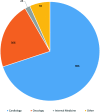Perspectives on the COVID-19 pandemic impact on cardio-oncology: results from the COVID-19 International Collaborative Network survey
- PMID: 33292763
- PMCID: PMC7691954
- DOI: 10.1186/s40959-020-00085-5
Perspectives on the COVID-19 pandemic impact on cardio-oncology: results from the COVID-19 International Collaborative Network survey
Abstract
Background: Re-allocation of resources during the COVID-19 pandemic has resulted in delays in care delivery to patients with cardiovascular disease and cancer. The ability of health care providers to provide optimal care in this setting has not been formally evaluated.
Objectives: To assess the impact of COVID-19 resource re-allocation on scheduling, testing, elective procedures, telemedicine access, use of new COVID-19 therapies, and providers' opinions on healthcare policies among oncology and cardiology practitioners.
Methods: An electronic survey was conducted by a cardio-oncology collaborative network through regional and state chapters of the American College of Cardiology, American Society of Clinical Oncology, and the International Cardio-Oncology Society. Descriptive statistics were reported by frequency and proportion for analyses, and stratified categorically by geographic region and specialty.
Results: One thousand four hundred fifteen providers (43 countries) participated: 986 cardiologists, 306 oncologists, and 118 trainees/internal medicine. 63% (195/306) of oncologists vs 92% (896/976) of cardiologists reported cancellations of treatments/elective procedures (p = 0.01). 46% (442/970) of cardiologists and 25% (76/303) of oncologists modified the scope of their practice (p = < 0.001). Academic physicians (74.5%) felt better supplied with personal protective equipment (PPE) vs non-academic (74.5% vs 67.2%; p = 0.018). Telemedicine was less common in Europe 81% (74/91), and Latin America 64% (101/158), than the United States, 88% (950/1097) (p = < 0.001). 95% of all groups supported more active leadership from medical professional societies.
Conclusions: These results support initiatives to promote expanded coverage for telemedicine, increased access to PPE, better testing availability and involvement of medical professional societies to help with preparedness for future health care crisis.
Keywords: COVID-19; Cardio oncology; Global Health; Health policy.
Conflict of interest statement
The authors declare that they have no competing interests.
Figures




References
-
- Johns Hopkins University Coronavirus Resource Center. Daily update.
-
- WHO . World Health statistics. 2019.
